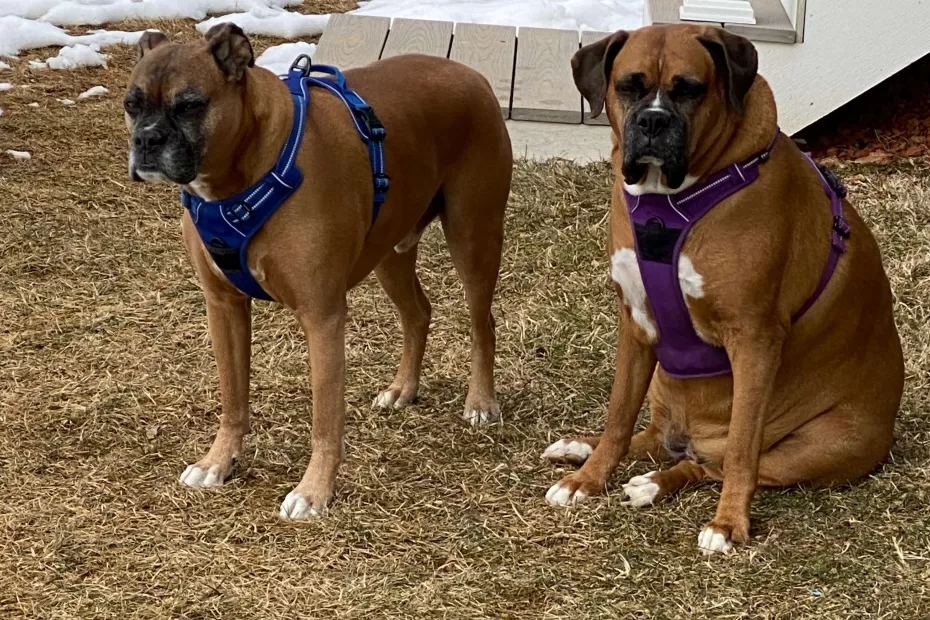This post contains affiliate links. See our Affiliate Disclosure Statement page for more details.
Table of Contents
How To Choose A Boxer Dog
After researching other dog breeds, or because of recommendations from family or friends, or you’ve always admired the Boxer dog, you decided to bring one into your home.
But you are unsure of how to choose a Boxer Dog that is best for you and your family and the Boxer. After all, it is important to consider how your decision affects everyone involved.
To help simplify the process, we are sharing 5 reliable criteria based on our experience working with Adopt A Boxer Rescue (AABR) for the past 18 years adopting Boxers and conducting home visits to assess the compatibility of Boxers and owners.
5 Reliable Criteria for How To Choose A Boxer Dog
- Understanding Breed Characteristics
- Assessing Your Lifestyle
- Boxer Dog Health Considerations
- Temperament and Compatability
- Socialization and Training
As we discuss the criteria for choosing a Boxer dog, we will also share our personal stories about each of the 5 Adopted Boxer dogs we’ve had as part of our family over the past 18 years.
We will share our approach when selecting a Boxer, the transition process, and how each Boxer became part of our family.

How To Choose A Boxer Dog – Understanding Boxer Breed Characteristics
According to the American Kennel Club in their article The Most Popular Dog Breeds of 2022, Melanie Haid, May 23, 2023, the Boxer ranks as the 16th most popular dog breed.
Boxers, have been named the “ultimate working dog” because of the many roles they played throughout their breeding history.
Boxer dogs were used as
- Hunting Dogs
- Watchdogs
- Police Dogs
- Guard Dogs
Boxer dogs were originally bred in Germany and brought to the United States early in the 20th Century. They began to become a popular breed in the US in the 1930s, according to the American Kennel Club.
How To Choose a Boxer Dog – Physical Traits
Boxer dogs are a stocky muscular breed with the average male boxer weighing between 65-80 lbs and their female counterparts weighing on average between 50 to 65 lbs. Source (Hillspet.com – Boxer Dog Breed Information and Personality Traits)
Boxers typically have short hair (coats) that come in a number of colors and patterns. The thickness of their coat can vary. Our Boxer dog Katie has thicker, coarser hair than our male Boxer Duke who has a thinner, softer coat.
The two most common colors of Boxer dogs are
- Fawn
- This is a light tan or yellow color, often with black mask markings on the face. The fawn color can vary in intensity from pale cream to a deep golden hue.
- Brindle
- Brindle Boxers have a fawn base coat with darker stripes or streaks of black or a darker shade of fawn. The stripes create a unique and striking pattern on the dog’s coat.
Boxers can also have white markings on their chests, paws, and faces, which can vary in size and placement.
However, solid white Boxers are also possible, but they are less common.
It’s worth noting that while these are the most recognized coat colors for Boxers, individual dogs can have variations in shade and pattern.
Always keep in mind that a dog’s genetics play a role in determining coat color and markings.
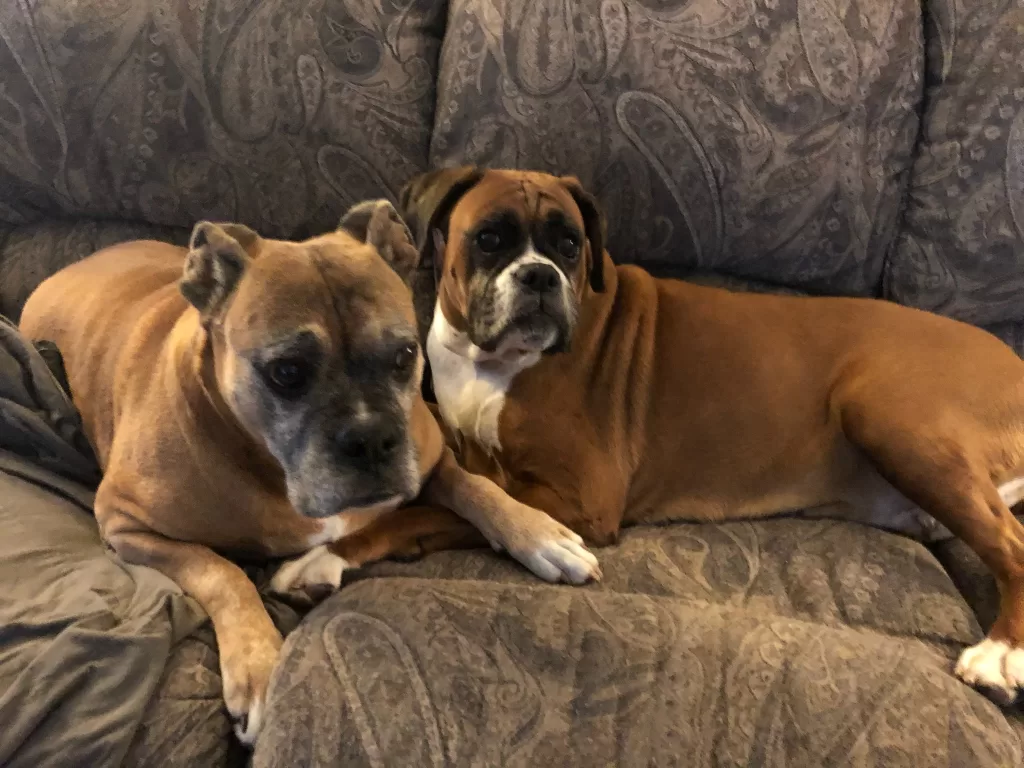
Our Boxers Duke (L) is a light-colored fawn and Katie (R) is a color variation called Red Fawn which is darker with a more reddish hue.
Male Boxers average 24 inches in height, while females on average are 22 inches tall. Source (Hillspet.com – Boxer Dog Breed Information and Personality Traits)
Boxers are known as a Brachycephalic breed which means that they have a compressed skull, or short snout.
Because Boxers have a compressed skull they do not do well extremely hot and cold temperatures. It is best to limit their outside activities in very hot conditions to early mornings and evenings. The same holds true for very cold temperatures, their exposure should be limited.
How to Choose A Boxer Dog – Temperament
- Energetic Nature
- Boxers are known for their high energy levels. They require plenty of exercise and mental stimulation to keep them from engaging in destructive behaviors like digging or chewing
- Boxers love playtime, going for walks, and spending time with their family. These activities provide good mental stimulation for a Boxer.
- Playful Demeanor
- Boxer dogs are often referred to as “clowns” because they carry their playful, puppy-like behaviors well into adulthood. They also get the moniker the “Peter Pan” breed because of this.
- Intelligent
- Boxers are intelligent dogs that do well with positive reinforcement training.
- Boxers can be stubborn and want to do things on their terms. Therefore, they were often labeled as less intelligent than other breeds when learning new skills.
- Boxers really enjoy when they are mentally challenged and thrive when you give them a task or problem to solve.
- Loyal
- Boxers are a very loyal breed and bond well with members of the family.
- They will often develop a strong bond with certain members of the family because they spend more time with them and have developed an emotional attachment.
- Social
- Boxers are very social dogs and often do well with other dogs provided they have been socialized to other dogs from a young age.
- Boxers do well with children, often being very protective of them which makes them very good family pets.
- Alertness
- Boxers are naturally alert dogs and react to changes in their surroundings. They will often bark if they sense someone approaching the house. These traits make them good “watchdogs”.
- Affectionate
- Boxers are affectionate dogs that like to spend time with their family. Therefore, they don’t like to be left alone for long periods of time.
- Boxers like to get close and will often lean on you to get attention.
Read our articles on mental stimulation, intelligence, exercise, and training for more information on how to choose a Boxer dog.
If you need dog walking or house-sitting services visit Rover.com using the link below for help in your local area
How To Choose A Boxer Dog – Assessing Your Lifestyle
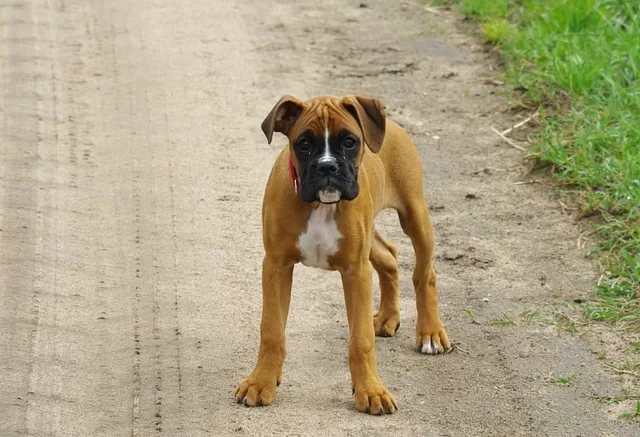
Boxers are high-energy dogs that love to play and be mentally stimulated. In addition, they relish the companionship of their family and do not like to be left alone for long periods of time.
When evaluating whether your lifestyle fits the needs of a Boxer dog it’s important to consider the following
- Exercise and Playtime Commitment
- Boxers need plenty of exercise including a minimum of 2 – 30 minute walks per day and time to play where they jump, run, chase, and play tugging games with toys.
- If you are an active individual or family, who likes outdoor activities, a Boxer would be a good fit because it would allow them to burn off their pent-up energy while at the same time enjoying time with the family.
- Time commitment
- Time away from home – If your job requires you to be away from home for extended periods of time on a regular basis, a Boxer is probably not a good fit. Boxers like companionship and do not like to be left alone for extended periods of time.
- Socialization
- Boxers enjoy being around their family, other people as well as other dogs if they have been properly socialized at an early age.
- If you or your family visit dog-friendly places or entertain at your home Boxers can be a great fit if properly socialized.
- Living Space
- Ideally, Boxers do better in homes with fenced yards where they can run, play and explore to expend their energy.
- If you live in an apartment and are considering a Boxer, you will need to take into account the amount of time you have to walk and play with the Boxer. If they are not properly stimulated they get bored and will engage in destructive behaviors.
- Family Dynamics
- Boxers are loyal family companions that usually do very well with children and other dogs when properly socialized, especially at an early age.
- If you already have another dog, consider how they will get along with the other dog in the house. Consider dominance issues that may take place.
If you are looking for exercise toys for your Boxer, we recommend the following products
How To Choose a Boxer Dog – Assessing Lifestyle – Our Personal Approach

Our Two Boxers Duke and Hazel
We’ve had two Boxers together at the same time in our house for the past 14 years with great success.
It’s important to keep in mind that we adopt rescue Boxers who have had difficult lives, Bait Dog (a dog tied to a pole and attacked by other dogs being trained to fight), and Puppy Mill Moms who have spent most of their lives in crates only there to produce litters and often neglected and treated harshly.
We use the same criteria when bringing a new adoption into our home as we would if we were adopting a Boxer puppy from the Boxer rescue.
When we are evaluating which Boxer is the best fit for our home and family we use the 5 criteria listed above.
Currently, 3 of the 5 criteria exercise and playtime, living space, and time commitment, are a constant since we are retired and have more time to spend with our Boxers.
We also have a home with a fenced yard so our Boxers can run, play and explore.
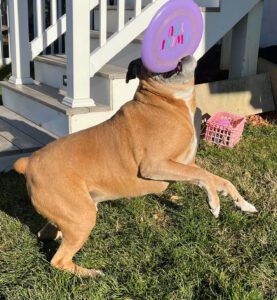
So, we spend most of our time evaluating family dynamics and socialization.
Duke, our 10-year-old male has been with us for 9 years. When choosing another Boxer we needed to carefully consider how he would get along with another Boxer.
Boxer Males usually do well with Boxer females. So, as part of our family dynamic review, we would start with female Boxers.
Since many of the females were Puppy Mill moms, and often have anxiety and other stress-related issues, we evaluate how they would acclimate into our family and how they would socialize with Duke.
We look at whether they have shown any issues with aggression, need special care, and how they associate with other dogs.
We interview the staff at Adopt A Boxer Rescue to get their feedback and any volunteers who have been fostering the Boxer in their homes.
We ask the following questions
- Have they shown any aggression towards other dogs because of their background?
- Do they need any special care – Medications, special care for anxiety issues, exercise issues? Are we equipped to be able to manage any special care they require?
- How well do they socialize with other dogs? Have they been living with other dogs in foster homes? What was the foster family’s assessment?
Once we feel comfortable with the answer to these questions we will bring the new Boxer into our home and introduce them to Duke.
Duke has embraced all of the new Boxer “sisters” and often assumes the role of the younger brother and follows his sisters around. The only exception is Katie where now Duke is the “older Brother”.
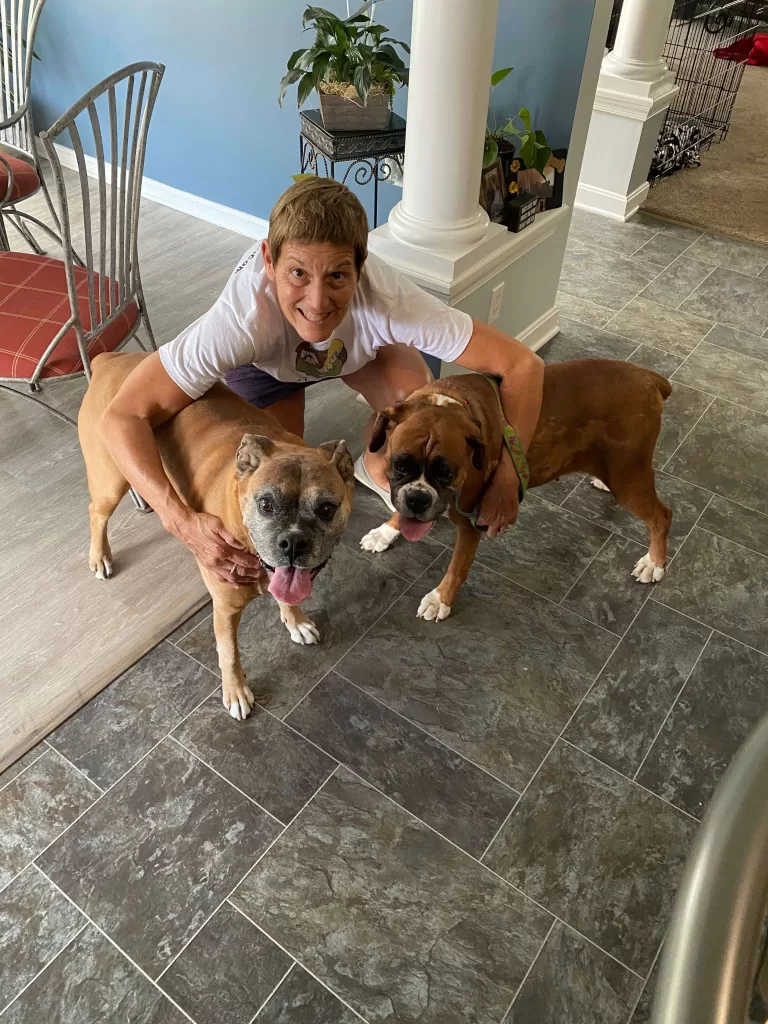

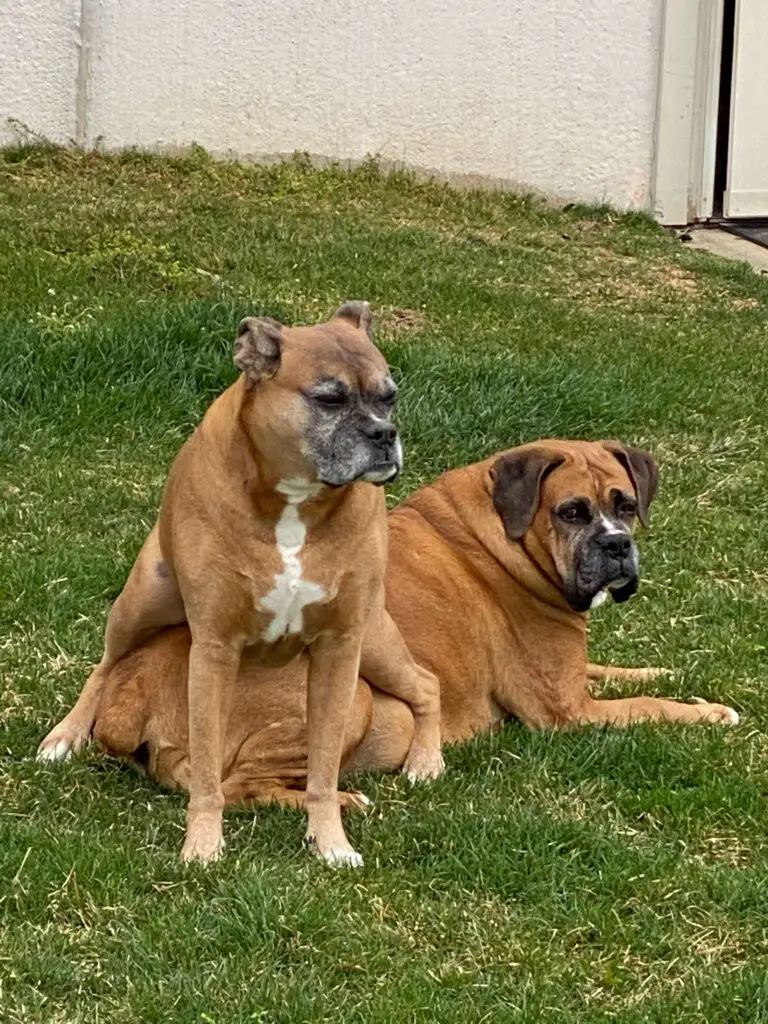
For more information on how to choose a Boxer dog read our article
Using these questions to guide our choices has helped ensure a smooth transition for both the family and the new Boxer.
If you need Pet Insurance to help defray the cost of medical bills, we recommend Odie Pet Insurance

How To Choose A Boxer Dog – Health Considerations

When evaluating how to choose a Boxer dog, it is important to evaluate some of the health conditions associated with the breed.
It is important to note, that health conditions are ones that have been noted with some regularity in the breed, but this does not mean a Boxer you choose will have these health conditions.
In the table below are some of the most commonly seen health conditions with the Boxer breed along with a description of the condition.
| Health Condition | Description |
| Hip Dysplasia | A genetic condition where the hip joint doesn’t develop properly, leading to discomfort and arthritis. Regular exercise, maintaining a healthy weight, and proper nutrition are crucial in managing this condition. |
| Cardiomyopathy | Boxers are predisposed to certain heart conditions like dilated cardiomyopathy, where the heart becomes enlarged and weakened. It is important to have your Boxer evaluated by a veterinarian for treatment and recommended diet. |
| Hypothyroidism | Hypothyroidism is caused when the thyroid gland is underactive and not producing enough thyroid hormones to keep your Boxer active. Hypothyroidism can cause weight gain, lethargy, and fatigue, as well as skin-related issues. Regular blood tests and medication can help manage this condition. |
| Cancer | Boxers are susceptible to various types of cancer, including lymphoma. Regular veterinary visits for early detection and awareness of potential signs are essential. |
| Gastric Torsion | Gastric torsion, also known as bloat, can develop into a life-threatening condition called Gastric Dilatation Volvulus where the stomach twists around itself cutting off the blood supply. Feeding multiple small meals, avoiding exercise after meals, and prompt veterinary attention is crucial. |
| Degenerative Myelopathy | A progressive neurological disease that affects the spinal cord, leading to hind leg weakness and paralysis. Early detection of this condition and intervention by a veterinarian can help the dog lead a good quality of life. |
When evaluating how to choose a Boxer dog based on health conditions, it is important to consider these factors.
- Health History
- Inquire about the health history of the dog’s parents and previous litters. Reputable breeders conduct health screenings to minimize the risk of passing on genetic conditions.
- Breeder Credentials
- Select your Boxer from a responsible breeder who prioritizes health and well-being. They should provide health clearances for the puppy’s parents and offer a health guarantee.
- Physical Examination
- Before bringing a Boxer home, have a veterinarian conduct a thorough physical examination. This can help identify any potential health issues early on.
- Genetic Testing
- Reputable breeders often perform genetic testing to screen for known hereditary health issues. Ask for information on the genetic tests performed on the puppy’s parents.
- Vaccinations and Preventive Care
- Ensure that the puppy has received necessary vaccinations and preventive care, including deworming and flea/tick prevention.
- Behavior and Appearance
- Observe the puppy’s behavior and physical appearance. A healthy Boxer should be alert, active, and have a shiny coat.
- Avoid puppies that seem lethargic, have discharge from the eyes or nose, or show signs of discomfort.
For more information on how to choose a Boxer dog and Boxer Health conditions, review our article
We use and recommend PetCareRx for both prescription and Over-the-counter (OTC) medications and wellness products.
Shop with PetPlus! Get up to 40% off sitewide, unlimited free shipping and more with the annual savings program only at PetCareRx.com!How To Choose a Boxer Dog – Temperament & Compatability
When determining how to choose a Boxer dog it is important to understand the temperamental traits of the breed.
In the table below we summarized the temperamental traits of the Boxer dog and a brief description to help you when determining how to choose a Boxer dog.
| Temperamental Trait | Description |
| Affectionate | Boxers are known for their loving and loyal nature. They form strong bonds with their human family members and seek physical closeness. |
| Playful and Energetic | Boxers maintain their playful and puppy-like behavior even as adults. They have high energy levels and enjoy interactive playtime. |
| Friendly and Social | Boxers are generally friendly and get along well with people and other dogs if properly socialized from a young age. They often have an exuberant and approachable demeanor. |
| Protective Instinct | Boxers have a natural protective instinct, making them good watchdogs. They’ll alert you if they sense something unusual in their environment. |
| Intelligence and Trainability | Boxers are intelligent dogs that respond well to positive reinforcement training. They enjoy learning new tricks and tasks and thrive when mentally engaged. |
| Family-Oriented | Boxers often adore children and become cherished family members. They can be gentle and patient with kids if raised and socialized appropriately. |
When assessing how to choose a Boxer dog, it is important to consider the compatibility of a Boxer with your family. When choosing a Boxer dog, its important to ask yourself these questions.
- We have children and/or another dog, is a Boxer a good choice for our family?
- Boxers generally do very well with children and get along well with other dogs if properly introduced and socialized.
- Do I have the time and energy to commit to a Boxer?
- Boxers are an active breed that requires lots of exercise and mental stimulation. If lead an active lifestyle a Boxer may be a great fit for you and your family.
- Do you have the time to commit to spending time with a Boxer?
- Boxers thrive on companionship and interaction. If you have the time to commit, a Boxer will do very well in your home.
- Do you enjoy and have the time to train a Boxer?
- If you enjoy training and teaching your dog new tricks, a Boxer’s intelligence and willingness to learn can provide a rewarding experience for both of you.
- Does the Boxer seem to match your personality?
- Spend time with potential Boxer dogs and observe their behavior. Choose a dog whose personality aligns with your family’s preferences and lifestyle.
How to Choose A Boxer Dog – Training & Socialization
When deciding how to choose a Boxer dog, one of the final factors to consider is training & socialization.
We’ve covered this in great detail above, so we just want to point out a few other considerations.
- Boxers will do well with other dogs if properly socialized on a consistent basis.
- It is important to expose them to other people outside the family as well as other dogs.
- Age considerations
- Decide if you want a puppy, an adult boxer, or a senior Boxer. Puppies will require more time spent on socialization and training, while adult and senior dogs may have already been well-socialized to associate with other people and other dogs.
- Training
- Boxers are intelligent and willing to learn new things. In fact, they thrive when they please their family. Although they can be stubborn at times, they learn commands pretty easily when training with positive reinforcement.
For training your Boxer we use and recommend two at home training options for your Boxer.
Holly & Hugo offers a wide variety of training courses to fit specific training needs. We like these self-paced courses to focus our Boxers training.
We recommend Brain Training For Dogs if you are trying to eliminate Bad Behaviors that your dog is engaging in.
How to Choose A Boxer Dog – Summary
When deciding how to choose a Boxer dog it is important to consider 5 key criteria
- Understanding Breed Characteristics
- Assessing Your Lifestyle
- Boxer Dog Health Considerations
- Temperament and Compatability
- Socialization and Training
Ultimately, when deciding on how to choose a Boxer dog, you want to find a dog that fits you and your family’s lifestyle and personality.
Remember when choosing a Boxer it is important not only to consider what is best for you but for the Boxer as well.
Boxers are loyal, loving dogs that make wonderful companions. We hope the criteria above will help guide you when deciding on How to choose a Boxer dog.

Discoverboxerdogs.com are Mary and Chris Kustanbauter. We reside in Red Lion, PA with our two Boxers, Duke and Katie, who are both rescue dogs. We have been working with Adopt A Boxer Rescue for the past 17 years and have adopted 5 Boxers from this fine organization. To learn more visit our Home, Boxer Dog Family, and Blogs Pages Visit us on social media on Facebook – Discoverboxerdogs.com, Instagram, and Pinterest

